#camulodunum
Explore tagged Tumblr posts
Text
Coin of the Day #107 (8/19/2024)
A scarce type from a mint you don’t often see…
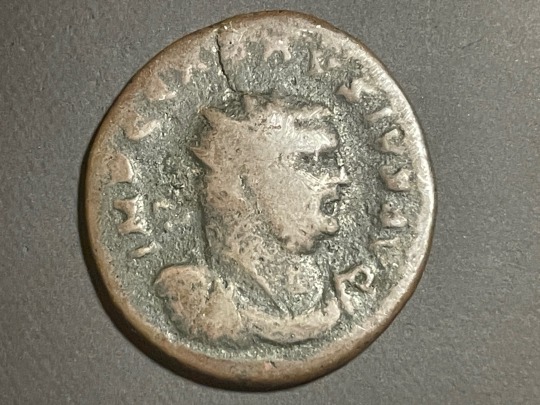
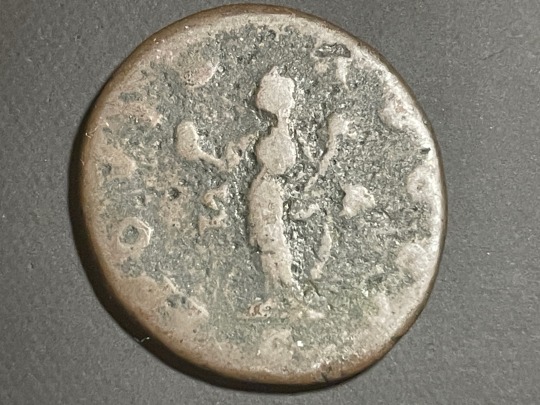
Roman Splinter State - Britannic Empire
BI Antoninianus - 22mm 3.58g
Carausius 286-293 AD
Camulodunum Mint
Obverse IMP C CARAVSIVS AVG
Bust of Carausius right, radiate, draped, cuirassed
Reverse PROVID AVGGG
Providentia standing left, holding baton and cornucopiae, globe at feet, S left, P right, C below
RIC V 364
#coin of the day#roman empire#britannic empire#third century crisis#Carausius#camulodunum#roman coins#ancient rome#coin#coins#numismatics#ancient coins#ancient britain#britain
6 notes
·
View notes
Text
thinking about how this space was inhabited for about 500 years, and now it's been like 1500 since there's been a settlement there. I wonder if the landscape ever misses it
that said it's so interesting that this was a major roman town & yet there's nothing here anymore. like there's no continuous inhabitation besides a couple nearby farms, at some point people just left it & moved away
#it's so interesting being there & having pretty much the entire surrounding wall still there but nothing in the middle. idk.#sort of a funny feeling. not a bad one by any means it was very comfortable but like.#imagine being a city for so long & then not being one again#thoughts#like verulamium & eboracum & camulodunum & londinium are all still going strong & calleva has sheep sometimes
47 notes
·
View notes
Note
Guesses on the next game’s naming scheme? I’m going for Roman towns. The fan base is really divided over what they think about Camulodunum.
we'd probably constantly call them cam or cammy for short
10 notes
·
View notes
Text
One of History's Greats
Boudicca
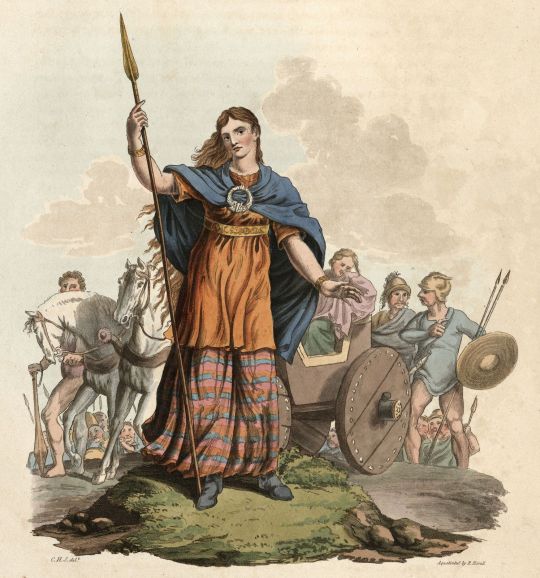
Boudicca was a famous Warrior Queen of the Iceni tribe. In 60 or 61 AD, she led an uprising against the Roman Empire with the Iceni and many of the other Celtic tribes at her back. Her forces massacred an estimated 80,000 Romans and their supporters. Three cities were razed, Camulodunum, Londinium, and Verulamium. Camulodunum burnt with such a ferocity that the scorched earth still runs beneath modern Colchester, called the ‘Boudiccan Destruction Horizon’ by archaeologists.
The uprising was in direct response to Rome’s annexing of her kingdom. After her husband died, she became ruler. The Roman elite saw her as unfit to rule because she was a woman. The Roman soldiers publicly flogged her and raped her daughters.
They were eventually overcome after Rome was forced to bring in over three legions to subdue Boudicca’s forces. She died during that uprising, poisoning herself rather than be taken prisoner with no hope of escape.
2 notes
·
View notes
Text
Boudicca
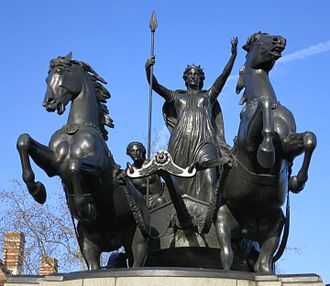
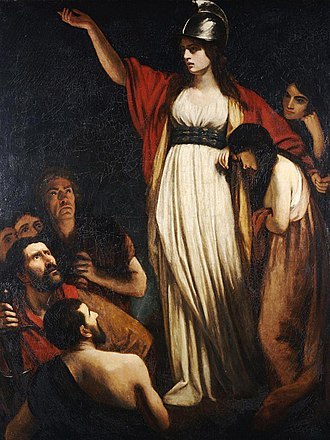
Queen Boudicca is considered to be a British heroine and a symbol of the struggle for justice and independence. She was a queen of the ancient Iceni tribe, and she led a failed uprising in 60 or 61 CE. Her name literally translates to "Victorious Woman", and it is sometimes spelled Boudica, Boudicca, Boadicea, and Boudicea, and sometimes as Buddug in Welsh.
Not much of Boudicca's early life is known, but it is believed she was not of the Iceni tribe and rather of royal descent. We don't even know when she was born, though it is estimated she was born between 25 and 30 CE. The historian, Cassius Dio, wrote "In stature, she was very tall, in appearance most terrifying, in the glance of her eye most fierce, and her voice was harsh; a great mass of the tawniest hair fell to her hips; around her neck was a large golden necklace; and she wore a tunic of fivers colours over which a thick mantle was fastened with a brooch. This was her invariable attire." However, this was written more than a century after her death and wasn't translated into English until 1925, so it may not be accurate.
She may have married King Prasutagus of the Iceni tribe somewhere between the years of 43-45 CE. The Iceni was a Celtic tribe that inhabited what is now Norfolk in England, a parts of the neighbouring counties of Cambridgeshire, Suffolk and Lincolnshire. Her husband may have been one of the eleven kings who surrended to Claudius following the Roman conquest in 43. He was considered an ally of Rome and his tribe was allowed to remain independent to some degree, though disarmed.
Upon Pasutagus' death in 60 or 61 CE, he made his two daughters and the Roman Emperor, Nero, his heirs. The Romans ignored this will and absorbed the kingdom into the province of Brittania. It was Tacitus who detailed the Romans and their pillaging and ransacking, as well as the cruel treatment of Boudicca and her daughters. According to Tacitus, Boudicca was flogged and her daughters, possibly twelve years old, were raped.
Shortly after, Boudicca seemed to become the leading figure in a rebellion against the Romans, possibly because she wanted revenge for the humiliation she and her daughters had suffered. The first move was at Camulodunum (modern Colchester) where the queen captured the Roman forces. As the Roman governor, Seutonius, who was leading a military capaign in Wales, heard about the revolt, he left a garrison on the island of Mona and made his way to deal with Boudicca. He made it to Londinium (Roman London) before Boudicca but he was outnumbered and decided to abandon the town, which was burned down by the rebels after torturing and killing everyone who had remained. The Queen and her army proceeded onto Verulamium (modern St. Albans) and won another victory.
Suetonius regrouped his forces, amassing an army of 10,000 men at an unidentified location. They stood in a defile (a narrow pass or gorge between mountains or hills) and used this terrain to their advantage, apparently throwing javelins at the Britons. Though the Roman army was heavily outnumbered, Boudicca's army was defeated.
While Boudicca survived the battle initially, it is said she poisoned herself or that she fell ill. With Boudicca's defeat, the Roman's secured control over Britain.
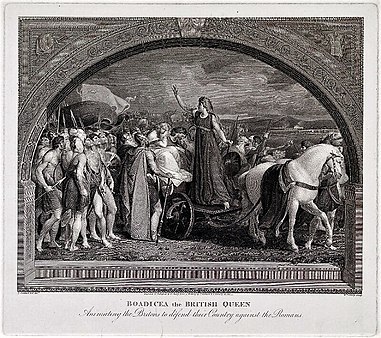

In film a TV, Boudicca has been portrayed four times.
Boadicea (1927), a British silent film starring Phyllis Neilson-Terry.
Warrior Queen (1978), a British television series starring Sian Phillips.
Boudica (2003), a British television film starring Alex Kingston.
Boudica (2023), a British drama film starring Olga Kurylenko.



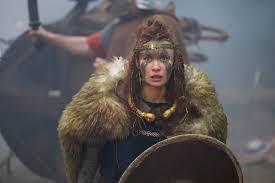
#boudica#boudicca#royal history#iceni tribe#boadicea#warrior queen#romans#roman#roman empire#briton#britain#queen#prasutagus#king#rome#emperor#nero
5 notes
·
View notes
Text
My long fic! Set first in Montreal, 2002, then all around England, following a certain band on tour...
Goldenheart
by Deniz_B
Stede’s in his last year at McGill University, sailing the life course charted by his father––earn the management degree, marry the chosen girl, take over the family business. One night, a mutual friend introduces him to Ed, fellow student and lead singer of an up and coming band. Their whirlwind romance has Stede standing up to his family for the first time––but it’s not enough. After a confrontation with his father, Stede is whisked away and locked up; his fairytale gone disastrously wrong. With an arranged marriage looming, Stede needs to be both the daring knight who rescues himself––and his enforced fiancée––and the prince who goes after his beloved. Except Ed’s band has caught their big break and are touring in England. No matter the distance, Stede’s determined to reach him. Can he do something this big on his own for the first time, without possessions, passport, or even a phone to let Ed know he’s on his way––before he loses the trust and love of the best man he’s ever met?
Or, March 2002 in Montreal: Stede and Ed find love among the snowy streets, late night pubs, and mayhem of the annual Saint Patrick’s Day parade––then try to find it all over again in deepest Yorkshire.
Words: 6109, Chapters: 1/26, Language: English
Fandoms: Our Flag Means Death (TV)
Rating: Explicit
Warnings: No Archive Warnings Apply
Categories: M/M
Characters: Blackbeard | Edward Teach, Stede Bonnet, Jim Jimenez, Oluwande Boodhari, Lucius Spriggs, Black Pete (Our Flag Means Death), Israel Hands, Fang (Our Flag Means Death), Ivan (Our Flag Means Death), The Swede (Our Flag Means Death), Frenchie (Our Flag Means Death), Wee John Feeney, Roach (Our Flag Means Death), Buttons (Our Flag Means Death), Edward Bonnet | Stede Bonnet’s Father, Chauncey Badminton, “Calico” Jack Rackham, Mary Allamby Bonnet
Relationships: Blackbeard | Edward Teach/Stede Bonnet
Additional Tags: Montreal, Bands, Parades, fast burn, Happy Ending, Snow, 5+1 Things, University, Alternate Universe - College/University, Holmfirth, deep Stede pov, canon level bullying, lots of fluff, there’s angst but it’s shorter because I can’t bear for them to be apart, Bagels, so many Montreal things but don’t worry I have notes, a couple of original characters thrown in as Easter eggs, also a few Tolkien Easter eggs, hinted RPF appearance by a real band, I’m all over the place with these tags but it’s my first long fic and I hope you all love it, I may have over used M dashes
source https://archiveofourown.org/works/46141291
#Our flag means death#ofmd#amwriting#thisdaywewrite#shoveitintotheluckhole#Montreal#bagels#St Patrick's Day parade#Holmfirth#Kedi Venti Pipire of Camulodunum
3 notes
·
View notes
Text
Enchant the Heavens review
I've been revisiting a lot of my favorite old historicals since my beloved kitty Peggy died about a month ago, and one of them is Enchant the Heavens by Kathleen Morgan.

When I was a college student I loved romance novels, particularly historical romance, even though most of my friends at the time thought it was ridiculous and made fun of me for reading them. It made me even more stubborn, and I clung to the genre like a barnacle onto the hull of a ship. However, there was one book at the time that was too cheesy even for me, and that was Enchant the Heavens.
I found the cover embarrassing. Look, my teenage self thought, the hero’s hands look like he’s about to crack the heroine’s skull! And the hero, Marcus, was so earnest. The book was so earnest. The culture at the time was saturated with snark and irony, and sadly, I was not immune. I set the book down.
Years later, in 2011, I revisited Enchant the Heavens, and I found myself… well, enchanted. I was swept away by the epic nature of the story and the endearing characterizations. And I reread it just a week ago. I admit, I was afraid the suck fairy might’ve visited it over the intervening years. But I found myself devouring it happily just as I did all those years ago. And it’s good.
Enchant the Heavens was the first novel Kathleen Morgan ever wrote, and it was a labor of love. It’s a big, passionate, visceral, breathtakingly earnest romance.The story involves a British chieftain’s daughter, Rhianna, and the Roman governor’s nephew, Marcus, during Boudicca’s revolt, and their love is an anguished, star-crossed love that takes a great deal of blood and tears and hard work to resolve. Unlike most romances set during this period, the Celts aren’t romanticized into nature-loving New Agers, and the Romans aren’t evil. And neither the heroine or hero give up their cultures or identities in the end; in fact they work on uniting their communities in the aftermath of war. It’s mature and refreshing.
The language does have a lot of archaicisms that kind of annoying. ‘Twould! ’Twas! Naught! Okay… You just have to run with it. But if you’re willing to dive in, there is a lot to love about it. Rhianna is not afraid of revenge, or using her sword, which is really delightful (to avoid spoilers, I won’t tell you who she kills). Marcus is a reasonable guy too, but there’s just the right amount of deeply felt angst that is perfect for a story about forbidden love. Sometimes I feel that Marcus and Rhianna verge on being idealized archetypes then actual people, but it kind of fits with how epic and operatic the story is. (It really captures the vibe of ancient Irish stories like Deirdre, which was the author’s intention.) The author walks the line of having them be larger-than-life figures, but they still grow and change, from a thoughtless girl and a career-driven aristocrat to a responsible, compassionate leader and a humbled man ready to sacrifice his dreams to help his lover and her people.
The research put into this book isn’t perfect— towards the end of the book, there’s an hummingbird, native to the Americas, in Rome — but it’s thorough and thoughtful, and I liked the depiction of the historical figures. For example, the depiction of Nero, who has a brief and memorable cameo, is almost miraculous in how… sensible it is (and ahead of its time given this was written long before the current reassessment of Nero and the 2020 show at the British Museum). There’s no orgies or lions or gladiators or martyred Christians or any other cliches that I’ve seen over and over again in the few historical romances set in this period. It’s astonishing.
Anyway, this book is long. It’s also epic and sweeping in every possible way, and I have a feeling a good chunk was left on the cutting room floor. I would kill to have the original, unedited draft. Rhianna’s relationships with her friends Eilm and Cordaella are given short shrift. Also I feel the destruction of Camulodunum, and Rhianna’s role in it, was also cut a lot. I would have liked to see more of that, and Rhianna coming to terms with how her actions affected innocent civilians.
But the pacing, given how long it is, is surprisingly tight. I thought the consistent themes of freedom, symbolized by the goshawk, was really beautifully done; not heavy-handed, but subtle; and the story really embraces the pagan religions of the time in a way that’s delightful. There’s so much I can’t get into, or this review would be twice as long. There’s battles, druids, psychic visions, continent-spanning political intrigue, murder, and possibly supernatural white boars sent by the gods.
And the ending is really satisfying. I wish it were 20 to 30k longer, but it’s great as it is. It’s an absolute banger of a story. It’s not perfect but I’d give it a 4.5 out of 5 stars.
Of course, what really sucks about it all is that this was going to be the beginning of a series, and the hero’s best friend Quintus was going to get a sequel.
There was, in fact, one sequel (Enchant the Dream) featuring the heroine’s brother Cerdic. But then the author converted to Christianity sometime in the late 90s, and her entire pre-conversion historical and fantasy backlist are completely unavailable. (Of course, her post conversion backlist is available.)
It pisses me off so much, because Enchant the Heavens is so good! And I wanted to see Quintus’s story! But that’s never going to happen. And there’s never going to be a legal digital copy of this book either, because the author has seemingly disavowed it.
But we’ll always have Enchant the Heavens, and even if Morgan wants to forget her pagan past, I am grateful she wrote this book. I highly recommend it.
13 notes
·
View notes
Text
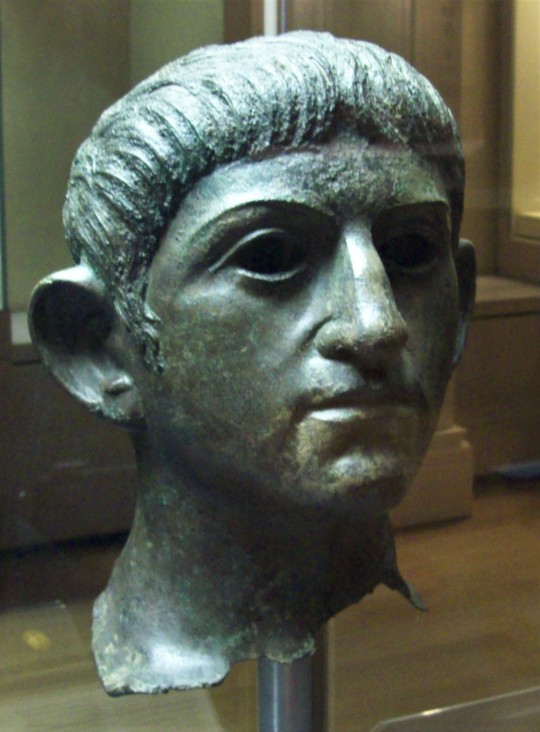
Romano-British copper alloy head of the emperor Nero from a life-size statue c. AD 54-59. British Museum 1965,1201.1 Possibly Gaulish manufacture. The head was found in the River Alde, Suffolk, on the boundary between British Iceni and Trinovantes tribal land, which suggests that it may have been deliberately deposited as an offering. The complete statue was probably torn down in nearby Camulodunum (Colchester) during the Boudiccan revolt c. AD 60 or 61.
2 notes
·
View notes
Text
BOUDICA // QUEEN OF THE ICENI
“She was the Queen of the Iceni tribe of Celtic Britons, who led a failed uprising against the conquering forces of the Roman Empire in 60 or 61. She is considered a British national heroine and symbol of the struggle for justice and independence. When her husband died, his will was ignored, and his kingdom annexed. Boudica was flogged and her daughters raped. Boudica led the Iceni, the Trinovantes and other British tribes in revolt. They destroyed Camulodunum (modern Colchester) and burned Londinium (modern London) and Verulamium. They were eventually defeated by Suetonius, a Roman governor, and Boudica killed herself to avoid captured.”

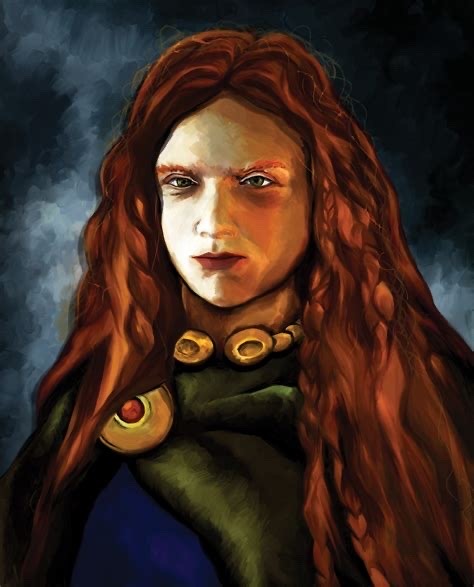
2 notes
·
View notes
Photo
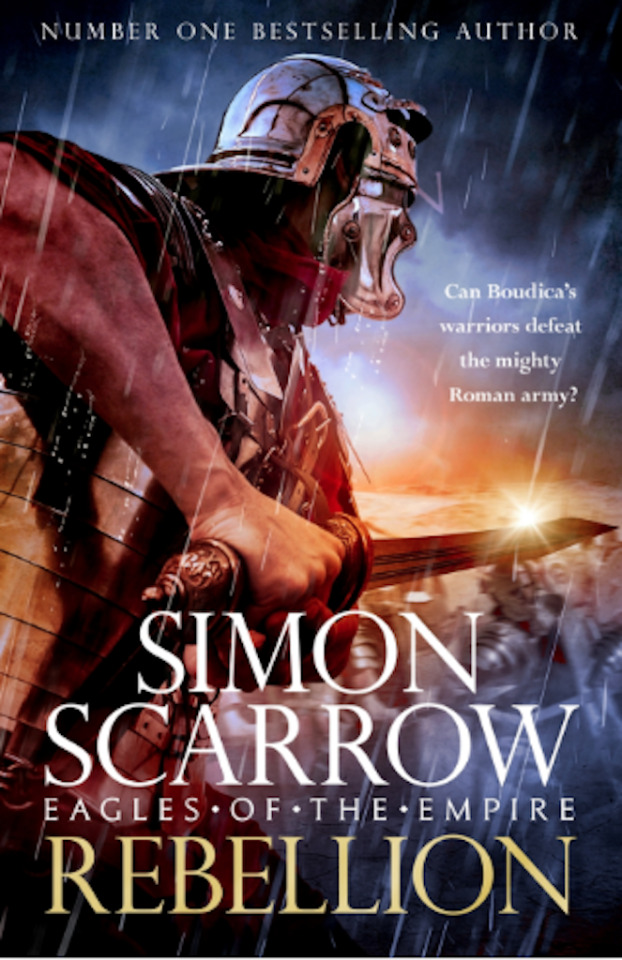
REBELLION by Simon Scarrow (EAGLES OF EMPIRE 22)
AD.60 and Brittania is in chaos. Boudica has had a taste of victory against the formidable veterans in Camulodunum and she won’t stop now. How will Roman heroes Macro and Cato fare against the notorious Queen of the Britons?
A quick response to the rapidly advancing rebel forces, Governor Suetonius takes command leading his army to the besieged Londinium with prefect Cato and a mounted escort in tow. The grim reality of Britannia slipping deeper into chaos and hysteria becomes unmistakable as tribal warriors continue to swell the ranks of Boudica’s forces. Both Cato and Suetonius confront the sobering truth that minimal preparations have been made to confront a full-scale insurrection.
Meanwhile, in Londinium, a heart-wrenching revelation unfolds. Centurion Macro is among those missing following the Camulodunum massacre. Has Cato's loyal comrade, who has faced countless battles, met his ultimate challenge? As disaster looms, Cato readies himself for the next strategic move. Can he dare to hope that Macro, marked by battle and unflinching courage, has managed to evade these bloodthirsty rebels? In this pivotal military campaign, Cato knows that only one man he trusts stands beside him, and the fate of the Empire in Britannia hangs in the balance.
Book page: https://www.headline.co.uk/titles/simon-scarrow/rebellion-eagles-of-empire-22/9781472287076/
My Review: Note: you can read this book as a stand-alone but I think it’s a sort of follow-up to Death to the Emperor, the previous novel in this long series. Boudica’s rebellion is described in a lot of books but I think this one that describe is it could have been. It was gory, violent, sometime very cruel insurrection, a sort of guerrilla that nearly defeated Rome. The author did a good job in described the sense of confusion, the excitement, the violence. This age is not known for any type of Geneva treaty or piety, the Roman pietas is the sense of loyalty not any type of kindness The novel is fast paced, action packed, with some heartbreaking moments. There’s a lot violence and some scenes are a graphic description of what it was described by the historian so you’d better skip them if you are squeamish. I was happy to catch up with Cato and Marco, felt for them and hope to read soon their new story as the aftermath of the rebellion won’t be easy. This story kept me reading till late in the night as I wanted to be sure that my favourite characters were going to survive. The storytelling is excellent and it’s well researched. There’s a lot of attention to the details. Highly recommended. Many thanks to the publisher for this ARC, all opinions are mine
The Author: Simon Scarrow is a Sunday Times No. 1 bestselling author with several million copies of his books sold worldwide. After a childhood spent travelling the world, he pursued his great love of history as a teacher, before becoming a full-time writer. His Roman soldier heroes Cato and Macro made their debut in 2000 in UNDER THE EAGLE and have subsequently appeared in many bestsellers in the Eagles of the Empire series, including CENTURION, INVICTUS and DAY OF THE CAESARS. Many of the series have been Sunday Times bestsellers. REBELLION marks no.22 of Simon’s Eagles of the Empire Novels.
Simon Scarrow is also the author of a quartet of novels about the lives of the Duke of Wellington and Napoleon Bonaparte, YOUNG BLOODS, THE GENERALS, FIRE AND SWORD and THE FIELDS OF DEATH; a novel about the 1565 Siege of Malta, SWORD & SCIMITAR; HEARTS OF STONE, set in Greece during the Second World War; and PLAYING WITH DEATH, a contemporary thriller written with Lee Francis. He also wrote the novels ARENA and INVADER with T. J. Andrews. His first Berlin thriller, BLACKOUT set in WW2 Berlin and first published in 2021 was a Richard and Judy Book Club pick with DEAD OF NIGHT following to critical acclaim earlier in 2023.
Simon and ‘Eagle of the Empire’ series: Simon’s inspiration for the "Eagle of the Empire" series stems from a fascination with the Roman Empire's military and political intricacies. Scarrow's meticulous research and dedication to historical accuracy are evident in his works, where he skillfully weaves narratives around real historical events and figures. Simon has been inspired by his own life and experiences and sees himself in both his main characters Cato and Marco - Cato being who he was as a student and Marco who he has grown up to be. He has a knack for immersing readers in the ancient world and through his novels, he invites readers to embark on those journeys back in time, where empires clash in battles that have shaped the course of human history but encourages us to draw parallels to the political now through his stories of the then.
Website: https://www.simonscarrow.co.uk/ Twitter: https://twitter.com/SimonScarrow
2 notes
·
View notes
Text
10 notes
·
View notes
Note
wooo, just reread the back story of Mr. Punch again and it still gives me the cold chills
“He liked being a Roman and he was good at it,’ he said. ‘Loyal, but not too loyal, to his patron. Generous with his largesse, diligent in his religious observance. He was a true believer in law and order and all the benefits that brings a man born without a taste for violence.”
“And then one day it all came crashing down. Queen Boudicca lost her rag and led an army of seriously pissed-off Trinis and Iceni down through Camulodunum and ground the useless fucks of the Ninth into dog meat – literally, in some cases.”
“The story is that they killed his wife and his kids in front of him to force him to reveal where he’d buried his treasure. Slowly and painfully, and one by one, because they didn’t believe him when he said nothing was buried. Because he believed in truth, justice and the Roman way – so why would he need to bury anything? By the time they were working on his youngest they say he was laughing like a madman. And this started to freak them out, those big, brave Iceni child-killing warriors, so they slit his belly and left him to die.”
“So up he sprang. A thing full of hatred and mad laughter, capering through the ashes of the city. Because order did not save his children. Law did not save his wife. And, for all his faith in the gods, they did nothing. ‘But London is London, because of the bridge and the river and the north and the south. And so, almost before the ashes were cool, the Romans were back with their groma and their chromates – drawing their straight lines across the world. Cata set about them – waylaying them in the dark places, whispering in the ears of the drunk and foolish, rocking the boats and kicking over amphorae full of fish guts.”
“They did more than that,’ said Tyburn. ‘They made him a god.”
all those lines hit like a train
Oh god, I always forgot about his backstory.
4 notes
·
View notes
Text
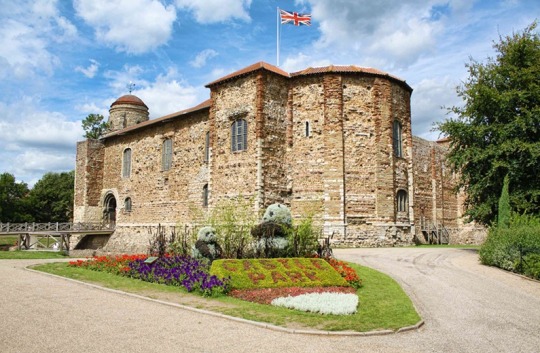
Colchester is a city in northeastern Essex, England. It is the second-largest settlement in the county, with a population of 130,245 at the 2021 Census. The demonym is Colcestrian.
Colchester occupies the site of Camulodunum, the first major city in Roman Britain and its first capital. Colchester therefore claims to be Britain's first city. It has been an important military base since the Roman era, with Colchester Garrison currently housing the 16th Air Assault Brigade.
0 notes
Text
The story that started it all! I read ClaireGregory's fics of fics, then went and read piñacoladas and I was hooked. There are 8/10 chapters of this fic written but so far I've only posted the first. The only one that heavily features original characters! A few make cameos in other fics, especially Kedi...
Interlude from A Stitch In Time
by Deniz_B
TL,DR: piña coladas rearranged my brain chemistry and my life and I had to write about it.
Long version: Once upon a time, I read all of ClaireGregory’s stories, including the piña coladas ones. Then I finished NaNoWriMo early, and had some time, and thought I ought to read piña coladas itself. (And then I watched the show! But that’s a different story.) I read it and reread it and then I had to write about it. I brought in some of my original characters to share my brainrot and I thought I would get it out of my system and things would calm down. Six months and five fics (and counting!) later, it seems that “calm” is no longer in my vocabulary. This story’s not finished, but it doesn’t seem fair to not have it up here, when it came first.
TL,DR: Amelie and Angus own a pub and inn on the Isle of Lewis in Scotland. Amelie reads piña coladas and has to tell Angus about it.
Long version in the notes
Words: 4008, Chapters: 1/10, Language: English
Fandoms: Our Flag Means Death (TV)
Rating: Explicit
Warnings: No Archive Warnings Apply
Categories: F/M, M/M
Characters: Original Characters, Blackbeard | Edward Teach, Stede Bonnet, Fancyman - Character, Fuckface - Character
Relationships: Blackbeard | Edward Teach/Stede Bonnet
Additional Tags: fic of a fic, Inspired by piña coladas - faeeebaeee, Infertility, Scotland, Isle of Lewis, pub, inn, farm, Marriage, all the songs from 1987, Age Difference, Happy Ending
source https://archiveofourown.org/works/46390942
#Our flag means death#ofmd#piña coladas#friday on my mind#tell me on a sunday#amwriting#thisdaywewrite#shoveitintotheluckhole#Kedi Venti Pipire of Camulodunum
2 notes
·
View notes
Text
Space Dock E41D00R was roughly the size of a middling asteroid. It floated halfway between the famous, glittering, Space Port Caerleon and the mining giant Camulodunum III, an afterthought tossed up as a fueling station during the pre-warp era.
Since the armistice, the residents of the small dock spent their days catering to the crews of heavy mining cruisers who stopped by for supplies and the odd maintenance call, and the occasional crop of tourists on their way to see the SPC from one of the farther-flung planets in the Albion system. The younger generation chafed at the monotony, having been raised in the thundering rush of the Wars, when the small dock was a critical piece of technology for the massive Kingdom warships. While everyone had longed for peace, and celebrated when it came, the younger generation quickly learned how boring it could be.
Then one day, everything changed.
When Merlin woke that morning he had nearly forgotten that it was the day. The artificial lights in his room buzzed to life as usual. His alarm cheerfully chirped out the stardate, dock time, and weather settings, only occasionally stuttering. He kicked off his blanket and shuffled to the port window, as he always did, rubbing sleep from his eyes.
It wasn’t until he saw the ship– a silver shape against the velvet blackness of space, decorated with blinking lights and sensors and bristling with canon and crowned with a sweep of elegant sensor arrays– that he remembered. They’re here!
#mine#merlin fanfiction#yes they are in space#yes this is trek inspired#yes I am so excited#SPAaaaAAAAACE#Into a land of myth and a time of magic we BOLDLY GO#yes we do
1 note
·
View note
Text
Introduction:
Nestled in the heart of Colchester, England's oldest recorded town, Castle Park stands as a testament to the rich tapestry of history, nature, and community that defines this iconic green space. Spanning over 11 hectares, the park is a cherished oasis of tranquility and beauty, offering visitors a captivating journey through the centuries, from its ancient Roman origins to its modern-day role as a vibrant cultural hub and recreational haven. In this comprehensive exploration, we will delve into the history, significance, and contemporary relevance of Castle Park Colchester, uncovering the stories and secrets that make it a cherished and enduring part of the local community.
A Journey Through Time: Ancient Origins and Medieval Legacy:
The history of Castle Park can be traced back over two millennia, to the Roman era when Colchester, then known as Camulodunum, was a thriving settlement and a key center of Roman administration and commerce. The park occupies the site of the ancient Roman town walls and the imposing Norman castle, which once stood as symbols of power and prestige in medieval England.
0 notes